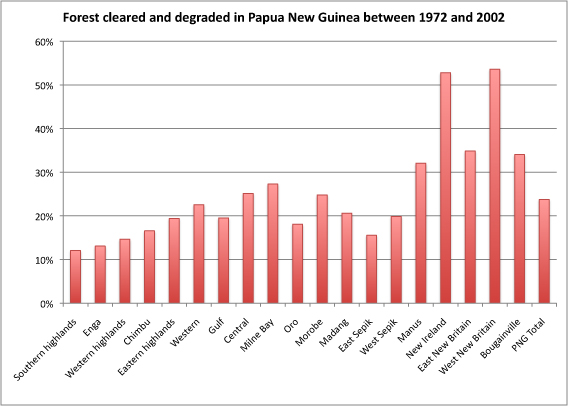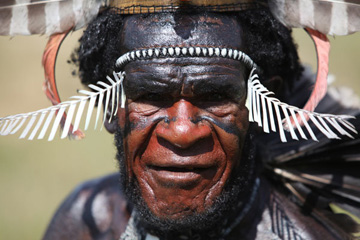Foreign corporations devastating Papua New Guinea rainforests
- Get link
- Other Apps
JEREMY HANCE
A letter in Nature from seven top scientists warns that Papua New Guinea will lose all of its accessible forest in just ten to twenty years if swift action isn't taken. A potent mix of poor governance, corruption, and corporate disregard is leading to the rapid loss of Papua New Guinea's much-heralded rainforests, home to a vast array of species found no-where else in the world.
"Papua New Guinea has some of the world's most biologically and culturally rich forests, and they’re vanishing before our eyes," author William Laurance of James Cook University in Cairns, Australia, said in a statement.
As logging is being driven largely by Malaysian firms, Papua New Guinea is seeing little benefit. After forests are cleared, raw logs are shipped to China for production into finished products, which are eventually exported to feed the demand of rich nations for cheap wood products. Rod Keenan, from the University of Melbourne, Australia, says that this system is not only undermining Papua New Guinea's forests, but its people.
"Despite all the logging, Papua New Guinea isn’t getting enough financial benefit. Instead of shipping raw logs to China they should be exporting more in products like sawn timber, plywood and furniture. This will create much more employment, training and value-adding for the country."
Papua New Guinea had pledged to ban raw log exports by this year, but that has not happened. In addition, widespread corruption is funneling much of the funds from the destruction to local political elites.
The ability to tackle deforestation in Papua New Guinea took another hit this Spring when Papua New Guinea's parliament passed a sweeping law that protects companies from lawsuits related to environmental destruction. At the time, a prominent lawyer in Papua New Guinea compared the law to deregulation in the US that led to the catastrophic BP oil spill.
"These are serious mistakes," said letter co-author Navjot Sodhi at the National University of Singapore. "Traditional land-rights protections should be reinstated, and a big push is needed to improve forest governance and slow rampant logging."
Ninety percent of land in Papua New Guinea is owned communally by tribal groups, yet these groups are seeing their land-rights stripped away to benefit foreign logging operations and Chinese manufacturers.
In addition, the Papua New Guinea government has frozen proposals on 120 new protected areas in a bid to placate foreign companies and development projects.
The authors point to the young carbon market as a possible way to stop the destruction. According to prior estimates, Papua New Guinea could make nearly half a billion dollars annually through climate change mitigation funds, if they materialize in time.
"We’re clinging to this hope because right now it looks like a tragedy in the making," said William Laurance.
While most of the attention on deforestation has been focused on Brazil, Malaysia, and Indonesia, forests in Papua New Guinea have been quietly disappearing. A study in 2008 found that nearly a quarter of the country's forests had been lost or degraded between 1972 and 2002, a number far higher than expected.

Read more: http://news.mongabay.com/2010/1021-hance_png_forests.html#ixzz132wsQdsl
"Papua New Guinea has some of the world's most biologically and culturally rich forests, and they’re vanishing before our eyes," author William Laurance of James Cook University in Cairns, Australia, said in a statement.
As logging is being driven largely by Malaysian firms, Papua New Guinea is seeing little benefit. After forests are cleared, raw logs are shipped to China for production into finished products, which are eventually exported to feed the demand of rich nations for cheap wood products. Rod Keenan, from the University of Melbourne, Australia, says that this system is not only undermining Papua New Guinea's forests, but its people.
"Despite all the logging, Papua New Guinea isn’t getting enough financial benefit. Instead of shipping raw logs to China they should be exporting more in products like sawn timber, plywood and furniture. This will create much more employment, training and value-adding for the country."
 Tribesman in Indonesian New Guinea. Photo by Rhett A. Butler. |
The ability to tackle deforestation in Papua New Guinea took another hit this Spring when Papua New Guinea's parliament passed a sweeping law that protects companies from lawsuits related to environmental destruction. At the time, a prominent lawyer in Papua New Guinea compared the law to deregulation in the US that led to the catastrophic BP oil spill.
"These are serious mistakes," said letter co-author Navjot Sodhi at the National University of Singapore. "Traditional land-rights protections should be reinstated, and a big push is needed to improve forest governance and slow rampant logging."
Ninety percent of land in Papua New Guinea is owned communally by tribal groups, yet these groups are seeing their land-rights stripped away to benefit foreign logging operations and Chinese manufacturers.
In addition, the Papua New Guinea government has frozen proposals on 120 new protected areas in a bid to placate foreign companies and development projects.
The authors point to the young carbon market as a possible way to stop the destruction. According to prior estimates, Papua New Guinea could make nearly half a billion dollars annually through climate change mitigation funds, if they materialize in time.
"We’re clinging to this hope because right now it looks like a tragedy in the making," said William Laurance.
While most of the attention on deforestation has been focused on Brazil, Malaysia, and Indonesia, forests in Papua New Guinea have been quietly disappearing. A study in 2008 found that nearly a quarter of the country's forests had been lost or degraded between 1972 and 2002, a number far higher than expected.

Read more: http://news.mongabay.com/2010/1021-hance_png_forests.html#ixzz132wsQdsl







Comments
Post a Comment
Please free to leave comments.